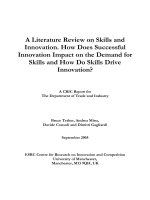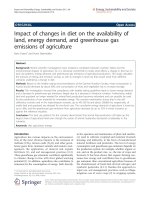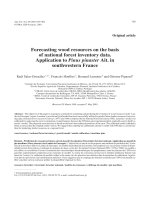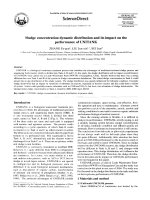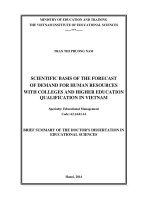Analyze On The Forecasting Demand
Bạn đang xem bản rút gọn của tài liệu. Xem và tải ngay bản đầy đủ của tài liệu tại đây (80.22 KB, 3 trang )
Jul. 2005, Volume 4, No.7 (Serial No.25)
China-USA Business Review, ISSN 1537-1514, USA
Analysis on the Forecasting Demand of Front-line Worker
Zhenzhu Zhang∗
Tianjin University
Abstract: The importance of personnel forecast is pointed out in this paper, and also the author expounds
comparative analysis through instances among several methods of personnel forecast.
Key words: forecasting methods time series analysis causal forecasting
1. Introduction of Forecasting Methods
The normal forecasting methods are divided into three types, which are qualitative forecasting, time series
forecasting and causal forecasting [1].
Qualitative forecasting is used in the environment that lacks the statistic history information or the turn in the
course of events [2]. The primary methods are manager’s opinion, jury of executive opinion, sales force composite,
consumer market survey, Delphi method, and so on.
The method of time series analysis is used in condition that has enough statistic history information. The
types are set out in Table 1.
Table 1 The Methods of Time Series Analysis
The name of
forecasting
method
Last-value
Account method
Forecasting value
= Last value
[F]
[L]
Character
Application
No relativity between
value
Unstable time series
Average
F = Average of all values
Notable relativity between
value
Quite stable time
series
Moving
average
F = Average of the latest n values
Relativity between
contiguous value, the
data’s number reflect the
degree of stabilization
Moderate stable time
series
Adjusting α to adapt the
different stabilization
Time series from
unstable to quite
stable
Change slowly or change
by chance
The equal value of
probability
distributing changes
upwards or
downwards
Exponential
smoothing
F = α*L + (1-α)*(Last Forecasting Value)
[LF] α ∈
( 0,1) α: Smoothing constant
F = α* L + (1-α)*(LF)
+ (Trend estimate) [T]
T = β (The latest trend)[TL] + (1-β) (Last
Exponential
smoothing with
trend
∗
( )
time trend estimate) β ∈ 0,1
TL = α (L - Reciprocal second time
value) + (1-α) (Last time forecasting
value - Reciprocal second time
forecasting value)
β: Trend smoothing constant
Zhenzhu Zhang (1974-), female, Ph.D. candidate of School of Management, Tianjin University, Tianjin, China, Postcode: 300072;
Main research field: Supply Chain Management; Tel: 13011332163; E-mail:
64
Analysis on the Forecasting Demand of Front-line Worker
There is another method belonging to the time series analysis, which is called ARIMA or Box-Jenkins
method. It is so complicated that is achieved by software. It is applied in the problem, which has visible time
variety.
Causal forecasting confirms the linear or nonlinear relations between dependent variable and independent
variable through XY (Scatter) chart of observation data. When there are many independent variables causing the
variety of dependent variable, we call it as multi-linear regression. On the great mass of application, the nonlinear
relation can be changed into linear relation through forecasting the relation of dependent variable and independent
variable [3].
In the course of applying the forecasting, the work named model diagnose needs to choose or improve on the
original model according to the series of target value. The target value which is used to judge the model is mainly
as mean absolute deviation (MAD), mean square (MSE), R2, Adj.R2 and so on. The iterative work to diagnose
model make the target value achieve the ideal precision. Then, the opposite model of forecasting gains
optimization. In this paper, we use MAD and MSE as the target value. Their formulas are as follows [4]:
MAD the sum of forecasting error / the time of forecasting;
MSE the square sum of forecasting error / the time of forecasting
2. Analyzing from Example
The company A is a non-shop that sells commodities for pregnant woman and baby through call center to
order and confirm the price. There, the products are mainly comprised by high quality eatable nurture, clothing,
toy, washing commodity, interrelated books, magazines and remembrance. Every year, the company posts the
catalogs of product to plenty of users or potential consumers. The users are told to purchase through the telephone
number, which is printed on the catalog and then is connected to call center. Usually, we estimate the number of
client representation in the specific period of time through the statistic of call numbers. In this paper, we use the
above forecasting model to analyze the forecasting of front-line worker from this example. Now we know the sum
of call numbers in every quarter in the last three years as follows.
Table 2 The Every Quarter’s Total Call Numbers and Sales of Company A in the Last Three Years
The first year
Name
The second year
The third year
1
2
3
4
1
2
3
4
1
2
3
4
Call
number
6809
6465
6569
8266
7257
7064
7784
8724
6992
6822
7949
9650
Sale
century
4894
4703
4748
5844
5192
5086
5511
6107
5052
4985
5576
6647
We use excel and the Software-Crystal Ball 2000 to process modular arithmetic. In Table 2, the method of
causal forecasting uses sales as independent variable and the linear regression equation as follows:
y a b x, through this model, we use the method of least squares to confirm, then we get a = -1223.86; b =
1.6324. The result is in Table 3.
Table 3 The Target Value of Every Forecasting Method
The name of forecasting method
MAD
MSE
65
Analysis on the Forecasting Demand of Front-line Worker
Last-value
295
145909
Average
400
242876
Moving average
437
238816
Exponential smoothing
324
157836
Exponential smoothing with trend
345
180796
Cell linear regression
35
1838
Note: In Exponential smoothing α = 0.5; In Exponential smoothing with trend α = 0.3, β = 0.3.
From Table 3, we know that the call numbers have obvious season fluctuation and are closely correlative
with distribution. So the target value of linear regression is far less than the others. The method of causal
forecasting is more appropriate than the other methods in this case.
References:
1. Shuangzeng Hu, Ming Zhang. Logistics System Engineering, Tsinghua University Press, 2000: 58-60
2. Chunshan Feng, Jiachun Wu, Jiang Fu. Research on the Integrate Exertion of the Qualitative and Quantitative Forecasting
Method (Natural Science Edition), Journal of Donghua University, 2004(6): 114
3. Yongnin Jia. Apply the Method Forecasting to the Decision-making, Railway Communication Signal, 2004(5): 12
4. Frederick S. Hillie, Mark S. Hiller. Introduction to Management Science, China Financial & Economic Publishing: 550-562
(Edited by Dragon, Joy and Sun)
66


